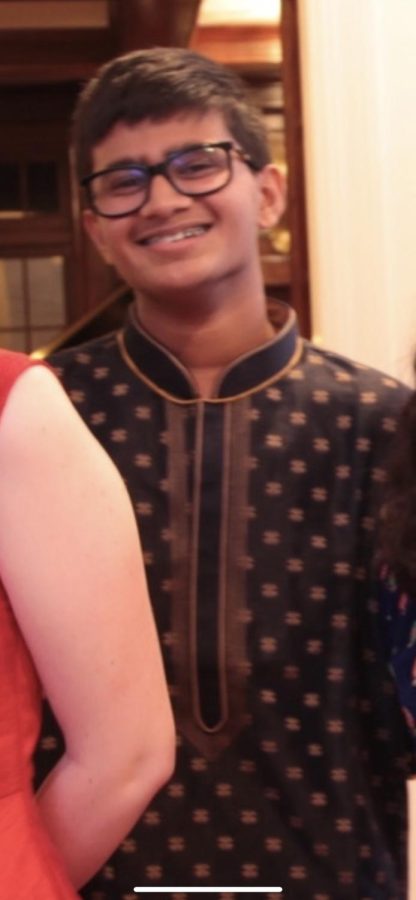Freshman Samir Shaik
May 6, 2022
Freshman Samir Shaik takes a photo with his friends dressed in traditional clothes during a Hindu holiday called Dusshera.
While freshman Samir Shaik’s parents immigrated from India 20 years ago in search of career opportunities, Shaik still tries to maintain contact with his family in India through technology, despite the challenge that distance poses.
“[My parents’] families are in India. Even now most of their families are in India. It’s sad to think about, but I don’t really have that strong of a relationship with a lot of my aunts, uncles and cousins who are still in India. I don’t see them on a day-to-day basis like people who have family here would. I don’t really think about them that much, but whenever I get to video call or chat with them, it’s always great. I don’t have that strong bond [with my family] that kids who have family that live in [the U.S.] would have,” Shaik said.
Shaik says that attending school in the U.S. has revealed cultural differences to him between his own culture and that of his peers, such as different food, cultures and relationships with parents.
“In elementary school, I didn’t really notice any [differences from my peers]. We were all having fun. It was just one big community,” Shaik said. “But as I got older, I noticed disparities. I started noticing those things, but every parent is different. Every student is different. It’s just about accepting our differences.”
Shaik has traveled to India three or four times and has noticed cultural disparities in his travels as well. Regardless of any differences, Shaik feels that an individual’s culture makes up a large portion of their identity.
“[The cultural disparities] take a little bit of getting used to, but it’s always fun to see my family in person and not through a video call screen. Culture and daily life are just really different. Everyone dresses differently compared to the U.S. and the social customs are different. It’s a culture shock to me,” Shaik said. “Cultural identity is a big part of who we are [and] who everyone is as a person. Different cultures will produce different people. You’re a product of your culture. I’m glad I get to experience this culture because it allows me to [have] a unique experience that not many American kids will get.”
Around 15,000 St. Louis citizens were originally born in India. Shaik feels that the Indian community in St. Louis is very strong, and by connecting with them, he finds a sense of comfort.
“I have a lot of friends who are Indians, and I always like to meet and talk to Indians at school and out of school because we have commonalities between us with [our] culture, so we always can relate a little bit more. It builds a bigger, stronger community that can allow more people to feel welcome and feel accepted,” Shaik said. “I feel like immigrants have stronger relationships with other immigrants. The Indian community in St. Louis is really tightly knit. Our family has a pretty big community of friends. Whenever I go to gatherings, I feel this extra warmth, and I feel this extra sense of community that I don’t really feel when I go to American parties.”
Shaik has also encountered stereotypes as a result of his culture, such as the misconception that immigrant parents are extremely harsh on their children in regard to academics and career choices. However, Shaik feels that he does not fit the stereotype as both of his parents have careers in the STEM field, but he doesn’t feel pressure to enter the same field.
“A stereotype is that all immigrant kids are in all honors classes. Their only life is in school. This isn’t true, at all,” Shaik said. “People perceive immigrant countries that have a lot of immigrants in the U.S. as just churning out all these super-smart genius people, and then they see all these kids at school who are like that, and they expect them to be the same. It’s sad because they’re stereotypes. They’re not true. It’s really hurtful when people always spread them because [they’re] spreading lies, basically.”
As a child of immigrants, Shaik has noted a variety of positive and negative consequences, specifically within his culminating cultures.
“[Being a child of immigrants] has its ups and downs. There have been some times where I wish I wasn’t a child of immigrants, but there have also been times where I really loved that I’m a child of immigrants,” Shaik said. “I get to enjoy this different culture that is not as prevalent in the U.S. We get to practice [these] really cool, really different cultural traditions. You just have to accept your culture and be who you are. [You have to] embrace your culture [and] embrace our differences, because that’s what brings us together.”

